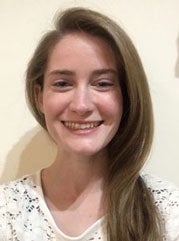 KINGSTON, R.I., May 17, 2016—Two University of Rhode Island Honors Program students have won scholarships to study languages overseas—one in China, the other in Mozambique.
KINGSTON, R.I., May 17, 2016—Two University of Rhode Island Honors Program students have won scholarships to study languages overseas—one in China, the other in Mozambique.
Nikkole Turgeon, 21, a medical laboratory science major, will study Portuguese in Mozambique for one semester, preceded by an eight-week intensive language program at the University of Florida in Gainesville.
And Lauren Buchholz, 22, with majors in economics, political science and Chinese, will study Mandarin at Beijing Union University for two semesters. Buchholz is studying in Spain this semester.
The David L. Boren Scholarship is one of the most prestigious study abroad awards offered to American college students.
The National Security Education Program, a federal initiative to expand the pool of American citizens with foreign language and international skills, sponsors the scholarship. In exchange for funding, recipients agree to work for the federal government for at least one year.
 Growing up in Warwick, Turgeon knew at an early age that she wanted to travel. In the summer of 2014, she was accepted as an undergraduate to participate in a faculty-led graduate program where she spent 10 days in Cusco, Peru volunteering at a cervical cancer clinic. That trip got her interested in seeing the world.
Growing up in Warwick, Turgeon knew at an early age that she wanted to travel. In the summer of 2014, she was accepted as an undergraduate to participate in a faculty-led graduate program where she spent 10 days in Cusco, Peru volunteering at a cervical cancer clinic. That trip got her interested in seeing the world.
After URI, she will pursue her dream of becoming a doctor, although she’s taken the less-traveled path. She’s majoring in medical laboratory science, a program that includes a yearlong accredited internship in medical technology at Rhode Island Hospital.
Her hard work and commitment led to scholarships from the Rhode Island Blood Center, American Society for Clinical Pathologists and American Society for Clinical Scientists.
Turgeon is also a member of the URI Honors Program, a pre-health ambassador for URI and a recipient of the 2016 Academic Excellence Award in Medical Laboratory Science at URI. Besides her hospital internship, she is also working at Clinica Esperanza, a free clinic in Providence.
“It’s been a challenging and rewarding year,” she says. “It’s been nonstop working and school, but definitely worth it.”
After wrapping up her internship in early June, she’ll head to Florida for the intensive language program in Portuguese, then spend 3½ months in Mozambique, living with a local family in a coastal village and attending language classes at Eduardo Mondlane University. The two-part program is part of the African Flagship Languages Initiative, which offers Boren Scholars and Fellows the opportunity to study African languages and cultures by participating in domestic and overseas language programs in Akan/Twi, French, Portuguese, Swahili, Wolof and Zulu.
Few people know, she says, that Portuguese is the primary language in Mozambique. Why did she settle on that language? “My stepdad and grandparents speak Portuguese, so I’ve heard it all my life. I think it’s a rising language that will allow me to break through language barriers I’ll encounter in the medical field.”
After the trip, she hopes to fulfill her Boren federal service obligation by working as a medical technologist for a federal agency—maybe the Centers for Disease Control—while studying for the Medical College Admission Test. Her goal is to become an infectious disease specialist working in developing nations.
“URI,” she says, “has paved the way for that to happen.”
Buchholz spent the first 13 years of her life in East Greenwich and then moved with her family to a small town in Virginia in the foothills of the Appalachian mountains.
“My desire to see the world stemmed from this move,” she says. “My second day in Virginia culture shock struck me with the subtlety of an oncoming train. The attitude of the town was stifling.’’
Her mother, who had grown up in different countries throughout the world as the daughter of an American government worker, taught Buchholz the importance of tolerance and respect. “The blatant lack of tolerance was eye-opening,” says Buchholz. “From there, I knew that I wanted to learn about other parts of the world that many people from this small town pretended didn’t exist.”
She vowed to leave—and did. She chose URI for two reasons: It was close to her former home, and she received a scholarship. She eventually settled into studying political science and economics—and “discovered” Chinese.
“I didn’t even know URI offered Chinese classes when I enrolled, but I saw the class opening during my orientation,” she says. “I was elated. I had never studied an Eastern language and couldn’t wait to gain a greater appreciation for a culture I knew little about.”
Still, she thought she might study Chinese one or two semesters. The summer of her junior year, she studied in China and was hooked. That fall, she joined the URI Chinese Flagship Program, one of only 12 programs in the United States designed for students in any major to achieve a professional level of proficiency in Chinese, which is one of the most in-demand languages in business, government, and education.
Her Boren scholarship will help her study next year at Beijing Union University. During the first semester, she’ll take economics and political science classes in Chinese with Chinese students. In the second semester, she’ll do an internship at a Chinese company. Home will be a dorm room.
After her year in China, she hopes to work in the Foreign Service to fulfill her federal job requirement. Her goal is to work in international diplomacy and trade.
“I am humbled and grateful for the Boren scholarship,” says Buchholz. “I intend to show that the selection committee has chosen well.”
About the Boren: David L. Boren, a former U.S. Senator from Oklahoma, is the principal author of legislation that created the National Security Education Program and the Boren awards. He is president of the University of Oklahoma.
This year, 820 applications were received from undergraduate students for the Boren Scholarship and 165 were awarded; 350 graduate students applied for the Boren Fellowship and 105 were awarded. Boren Scholars and Fellows will live in 41 countries throughout Africa, Asia, Central and Eastern Europe, Eurasia, Latin America, and the Middle East. They will study 36 different languages. The most popular languages include Arabic, Mandarin, Russian, Portuguese and Swahili.
Pictured above:
In white jacket, Nikkole Turgeon, 21, of Warwick, who won a Boren scholarship to study in Mozambique. Photo by Michael Salerno.
And Lauren Buchholz, 22, a native of East Greenwich, who won a Boren scholarship to study at Beijing Union University in China. Photo by Lauren Buchholz.

